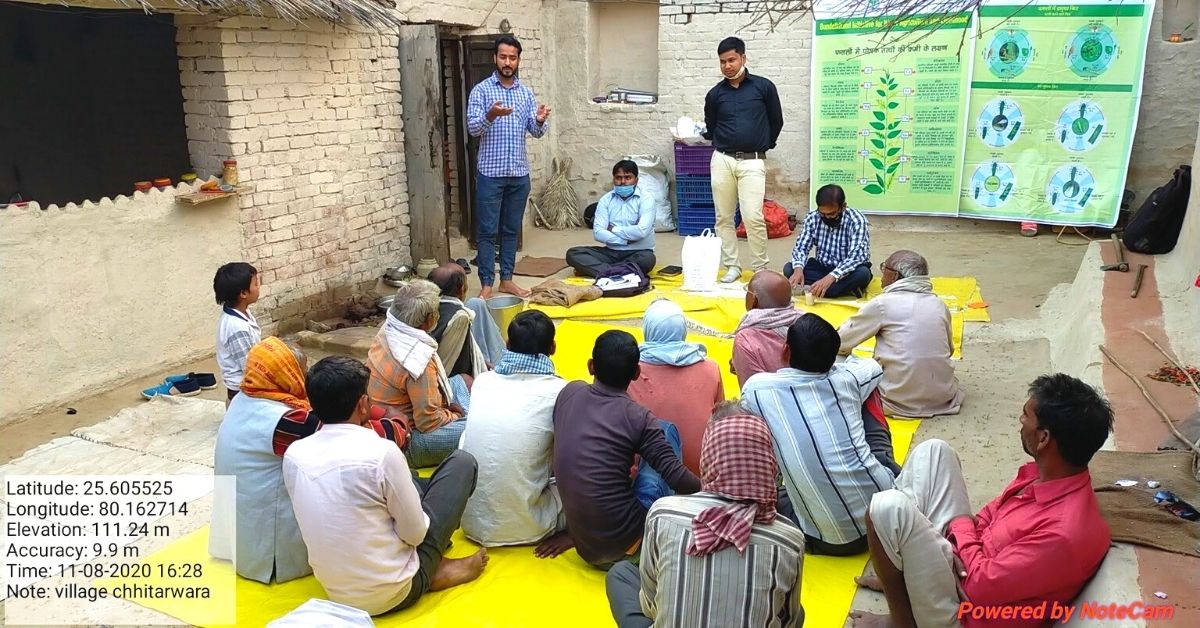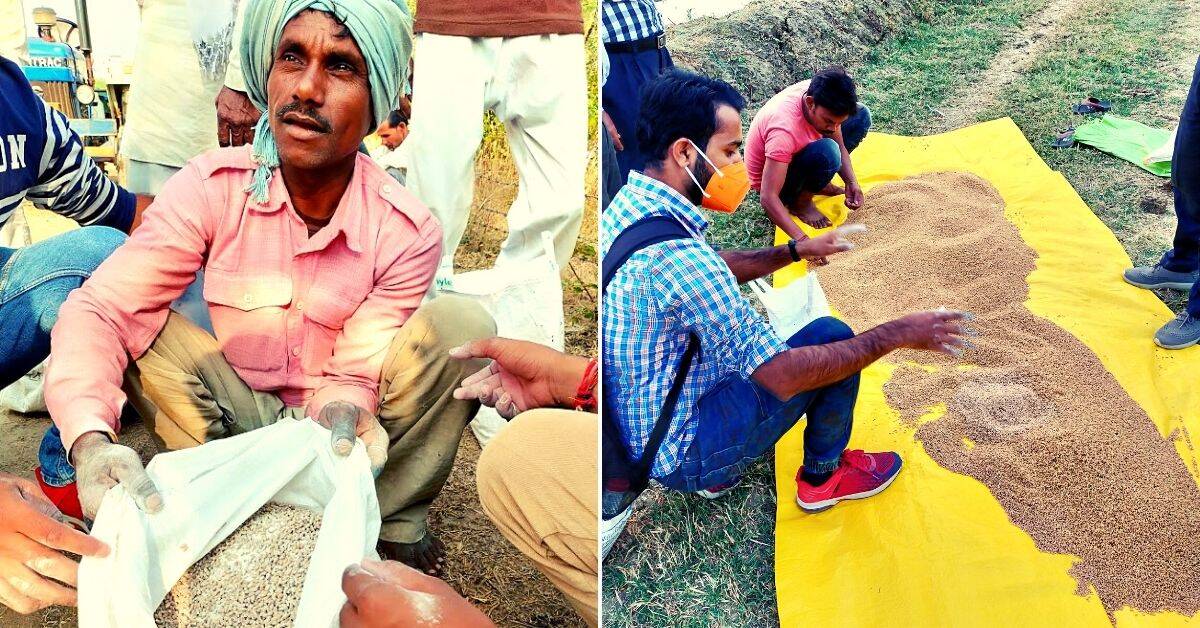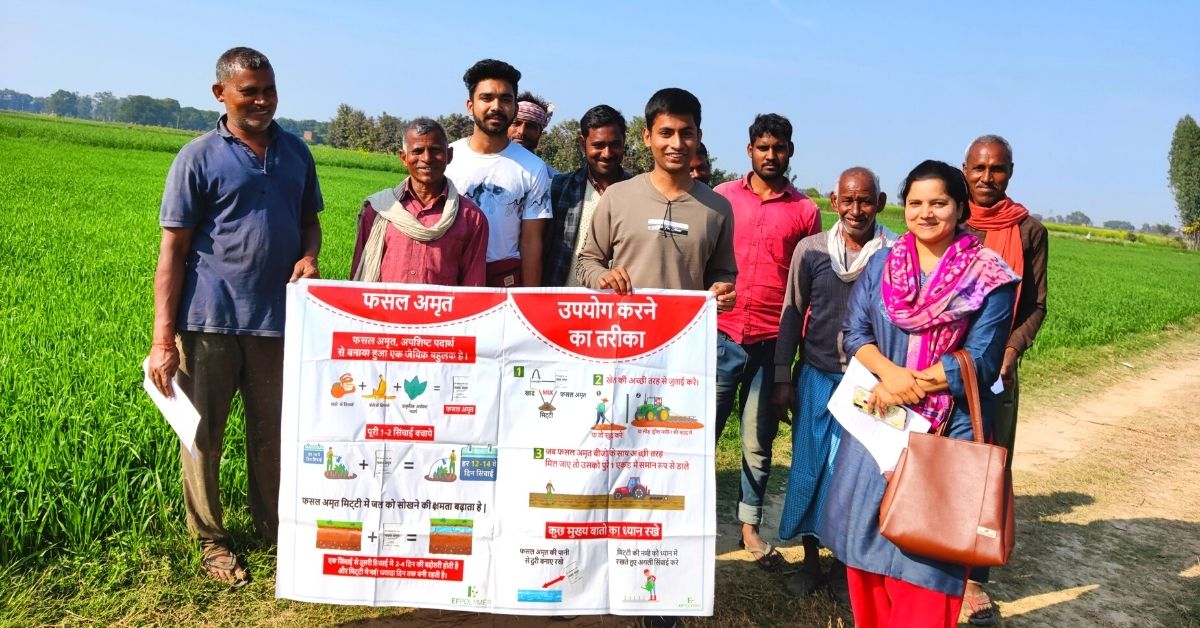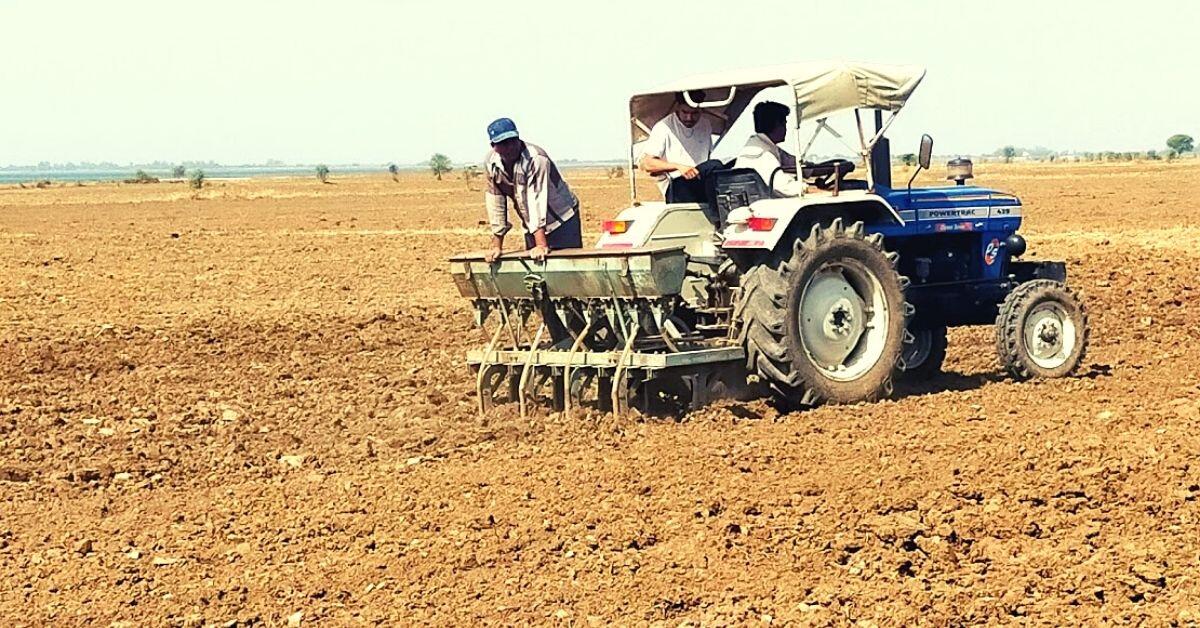Growing up in Boraj, a small village in Rajsamand district, Rajasthan, Narayan Lal Gurjar and Puran Singh Rajput had watched their families struggle with water scarcity while farming their entire lives.
After school, Narayan pursued a degree in agricultural engineering, while Puran proceeded towards a standard B.Tech in electrical engineering. Despite undertaking different courses, both men understood that their education and interest in science would one day lead them towards finding solutions to problems that their families had faced.
In 2018, they founded EF Polymer, an agritech startup, which came out of a project Narayan pursued in college, to help farmers save water in drought-prone areas. After multiple trials, they came up with Fasal Amrit, an organic super absorbent polymer made of bio waste from juice shops, which not only enhances the soil’s ability to retain moisture and thus lessen the amount of irrigation required, but also reduces the quantity of chemical fertiliser needed.
Since it is made of organic waste, it contains a great number of micronutrients to support better crop growth. Besides, it is organic in nature, as well as chemical and pollution free. It’s also interesting to note that Fasal Amrit is 100% biodegradable six months after application.
“As children, we’d seen our families struggle with water scarcity while working in the fields. This was our inspiration for establishing the startup. My father asked us to leverage our passion for science and understanding of agriculture to solve our problems. Despite multiple trials and errors, we continuously worked on a solution to address water scarcity for farmers in drought-prone areas such as Rajsamand district, and soon landed a prototype, while still studying in college. Using this prototype, we competed in multiple competitions, slowly improved the product, and eventually got the chance to register as a startup in 2018,” Narayan tells The Better India.

How to make Fasal Amrit?
It’s essentially a three-step process:
Step 1: Collect the raw material (fruit peels, vegetable trims) from juice vendors, farmers markets, restaurants, hotels, and universities’ food counters.
Step 2: This raw material is dried in solar tunnel dryers and then grinded into powder form. The powder of fruit and vegetable is processed to extract pectin and cellulose which is then used as the main raw material for polymerisation.
Step 3: After polymerisation, the EF Polymer team adds micro-nutrient extracted from the organic waste, which is very helpful for crop/plant growth.
‘Elixir for farmers’
“We came up with this name for our product since Fasal means crop, while Amrit stands for the elixir of life. When we developed our first prototype of Fasal Amrit, we felt it could be a life saviour for crops in areas where water is scarce. It’s a hydrogel or a polymer, which absorbs water and swells when it comes in contact with the liquid. The farmer has to mix this product into the soil because it’s in the form of a powder. They have to equally distribute this powder in the area they are going to grow their crops. We also suggest they mix our product with the seeds they’re going to sow, any kind of fertiliser, organic compost and, if nothing else, with the soil on the field,” says Puran tells The Better India.
Once mixed with the soil, the Fasal Amrit powder enhances its water retention capabilities. The amount of Fasal Amrit to be used depends on the area a farmer is targeting. “Say, a farmer has 1 acre of land. We then recommend they use 5 kg of Fasal Amrit. However, this again depends on the soil type. For example, there is a big difference between black soil and sandy soil. We recommend a higher concentration for sandy soil because its water absorption capacity is poor,” he adds.

How does Fasal Amrit work?
Let’s take the example of a farmer growing wheat in the Rabi season. Wheat usually requires five to six cycles of irrigation. If the weather is very cold, it can maybe grow with four cycles of irrigation. Each cycle occurs in intervals of 20 to 25 days.
Every 25 days, the farmer has to irrigate his crop. Now let’s take the example of a region where water is scarce, such as Rajasthan, Vidarbha, Gujarat or Telangana. When farmers there start sowing in the months of October and November, they have adequate supply of water because the monsoon season has just concluded.
“However, in the months of February and March, when wheat grains are about to emerge, water shortage is most likely because of rising temperatures and lower groundwater levels. This proves to be difficult for farmers during the fourth or fifth irrigation cycles. This is a very critical stage for the crop because if there is no water during the fruiting process, it won’t grow healthy, affecting both quality and quantity of harvest,” says Puran.
“Our polymer increases the moisture in soil. Say the farmer irrigates his wheat crop every 25th day. Using our product, that 25-day interval increases to 35 days, because it helps the soil retain water better. During a recent pilot project we conducted in the Bundelkhand area of Uttar Pradesh, we saw farmers irrigate after every 40 days. This allows farmers who have to irrigate every 25th day, and run out of water by the fourth or fifth cycle of irrigation, to save water. Instead of six cycles of irrigation, they now only have to employ three or four cycles, thanks to Fasal Amrit,” explains Narayan.
“Our product helps farmers save about 30 to 40% of water (reduce the cost of water or irrigate more crops/plants with saved water), lessens the requirement of chemical fertilisers by 20%, and in some cases increases crop yields by 15%,” claims Puran.
Does it work for all farmers?
Since its inception in 2018, the startup has enjoyed two key breakthroughs. In 2019, EF Polymer was selected for a one-year residency incubation programme by the Japanese government at the Okinawa Institute of Science and Technology (OIST). Besides funding to the tune of 10 million Yen (approx. Rs 65 lakhs), the startup enjoyed access to markets, mentorship, clients, training and established a good network with other investors.

The following year, it won the Social Alpha Agritech Innovations Challenge supported by the Bill & Melinda Gates Foundation and Tata Trust in partnership with IIT Kanpur. Winning this competition saw them receiving funding from the Uttar Pradesh government.
“Tata Trust is working with small and marginal farmers in Bundelkhand to increase their incomes. That’s where we got the opportunity to pilot our product on 200 acres of farmland. Tata Trust covered the cost of buying our products and farmers across Bundelkhand utilised it. We were working in about seven districts with different farmer producer organisations (FPOs) and local non-profits. The biggest difference we saw was in terms of rising intervals between irrigation cycles from 20-25 days to 40 days, increasing density of wheat harvest, and dark green-coloured pigmentation, which signals a much healthier crop. Another major difference was the crop yield during harvesting. Unfortunately due to COVID restrictions, in the last month, we were not able to visit the locations. Our implementation partners are working over there to help us get the necessary data. Once we get the data, we can share the impact of our product on yields,” Puran explains.
Narayan says that so far, EF Polymer has been able to sell 1,800 kg of Fasal Amrit to various farmers, covering nearly 400 acres of farmland. This, he claims, is purely organic demand since they haven’t done much to market it. They only started selling it in July 2020.
“Our future plan is to scale up our business. We are trying to achieve further validation for our product. We are trying to collaborate with the Krishi Vigyan Kendra (KVK) in different locations, proposing them to conduct a scientific study with our product on particular crops so that more scientific data about the amount of water or chemical fertilizer our product can save, effect of our product on the soil, and impact on yield can be measured,” says Puran.

“We are also trying to collaborate with some well known agricultural universities like the Maharana Pratap Agriculture University in Udaipur to obtain validated scientific data about our product. With their validation, we can pitch our product to governments. We are also reaching out to more FPOs to organise pilot demonstrations with a few farmer members. If the pilot succeeds, we will pitch to other farmers in the FPO. Because we come from a family of farmers, we don’t want to cause them any harm. Having said that, we know our technology is better and has positive effects, but it may not be for every farmer. That’s why we do these demonstrations in different parts of the country,” says Narayan.
The future looks bright for the Rajasthan-based startup. Last month, they raised 40 million Yen (Rs 2.7 crore) in a seed funding round from Japan-based venture capital investors. As their product earns greater validation, we will see more of them in the years to come.
(Edited by Divya Sethu)
No comments:
Post a Comment